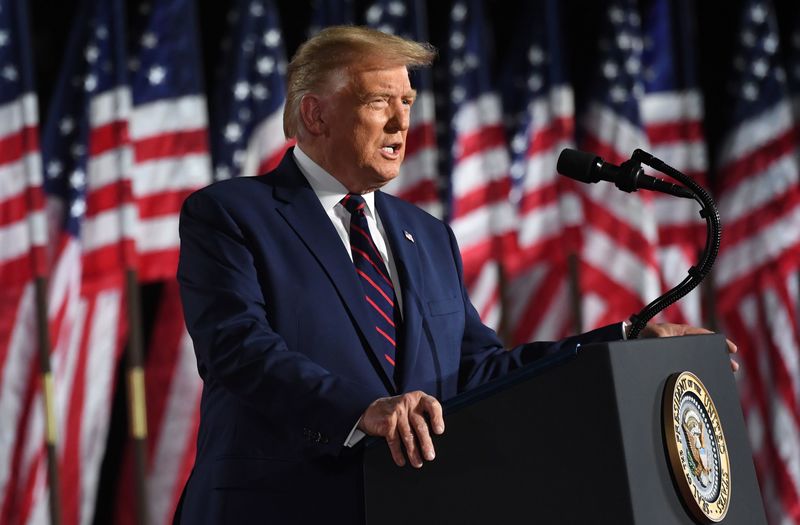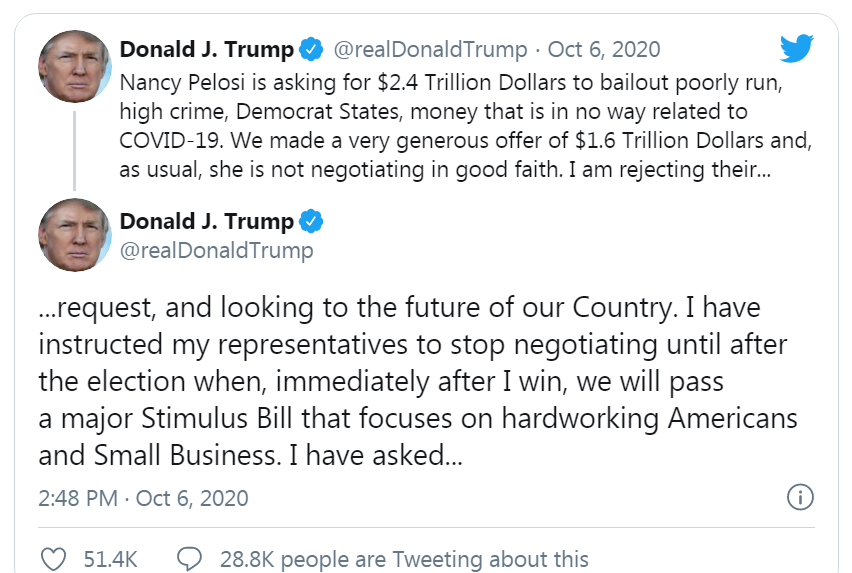
- Details
- By Levi Rickert
WASHINGTON — President Donald Trump, on his first full day back to the White House from Walter Reed National Military Medical Center where he was treated for Covid-19, abruptly broke off talks with congressional Democrats on the HEROES Act 2.0 that was approved by the Democratic-controlled House of Representatives last Thursday.
Trump announced he had ordered his representatives to stop Covid-19 stimulus talks with Democrats until after the election in a series of tweets Tuesday afternoon.
In a tweet, Trump said the biggest sticking point in the talks was the Democratic demand for aid to cash-strapped state and local governments, which are facing enormous shortfalls in their budgets because of the six-month Covid-19 pandemic.
Included in the House-passed HEROES Act 2.0 was an earmark of $9.5 billion for tribal governments. The breakdown of funds directed to tribes was:
- $8.5 billion to be dispersed in accordance to a formula developed by the Secretary of Treasury in Consultation with the Secretary of the Interior and tribal governments
- $1 billion to be split equally between all federally recognized tribes
Separate from the funds devoted to tribal, state or local governments was additional coronavirus response packages—or stimulus checks—which would have been $1,200 per adult and $500 for each dependent. With Trump’s announcement, there is no chance for these funds before the election.
Overall, theHEROES Act 2.0 was a stimulus package worth $2.4 trillion. The White House had offered a $1.6 trillion package.
Trump said on Tuesday House Speaker Nancy Pelosi "is not negotiating in good faith."

"President Trump showed his true colors: putting himself first at the expense of the country, with the full complicity of the GOP Members of Congress," Pelosi said in a statement. "Walking away from coronavirus talks demonstrates that President Trump is unwilling to crush the virus, as is required by the Heroes Act."
Unless, Trump’s decision is reversed, many American household that have been drastically financially hurt by the pandemic because of layoffs will continue to suffer. The package included relief for industries that have been hit hard by the pandemic, such as the airline and hotel industries.
More Stories Like This
Native News Weekly (August 25, 2024): D.C. BriefsUS Presidents in Their Own Words Concerning American Indians
Osage Nation Mourns the Passing of Former Principal Chief Jim Gray
Native News Weekly (February 15, 2026): D.C. Briefs
DHS Secretary Noem Tells Tribes ICE Does Not Target Native Americans
Help us defend tribal sovereignty.
At Native News Online, our mission is rooted in telling the stories that strengthen sovereignty and uplift Indigenous voices — not just at year’s end, but every single day.
Because of your generosity last year, we were able to keep our reporters on the ground in tribal communities, at national gatherings and in the halls of Congress — covering the issues that matter most to Indian Country: sovereignty, culture, education, health and economic opportunity.
That support sustained us through a tough year in 2025. Now, as we look to the year ahead, we need your help right now to ensure warrior journalism remains strong — reporting that defends tribal sovereignty, amplifies Native truth, and holds power accountable.
 The stakes couldn't be higher. Your support keeps Native voices heard, Native stories told and Native sovereignty defended.
The stakes couldn't be higher. Your support keeps Native voices heard, Native stories told and Native sovereignty defended.
Stand with Warrior Journalism today.
Levi Rickert (Potawatomi), Editor & Publisher

